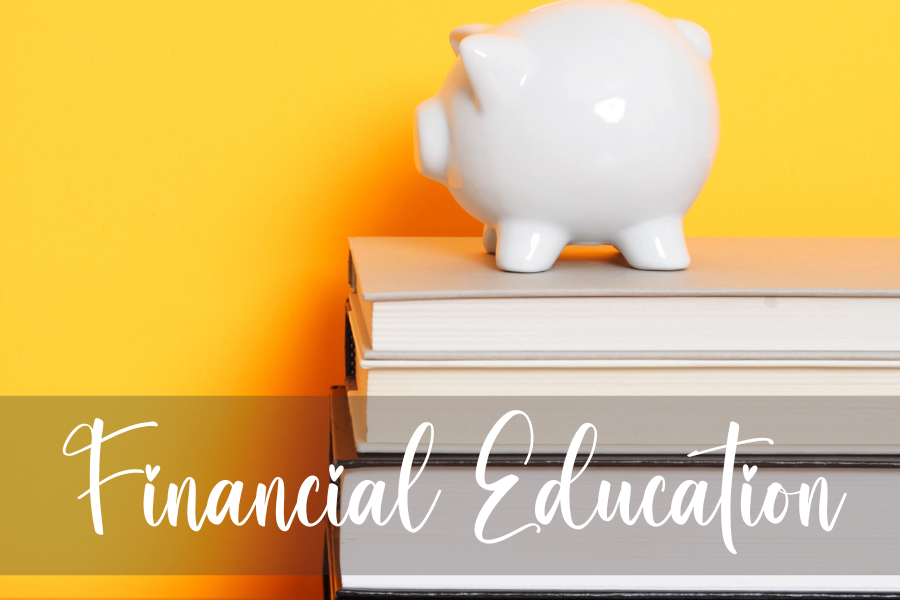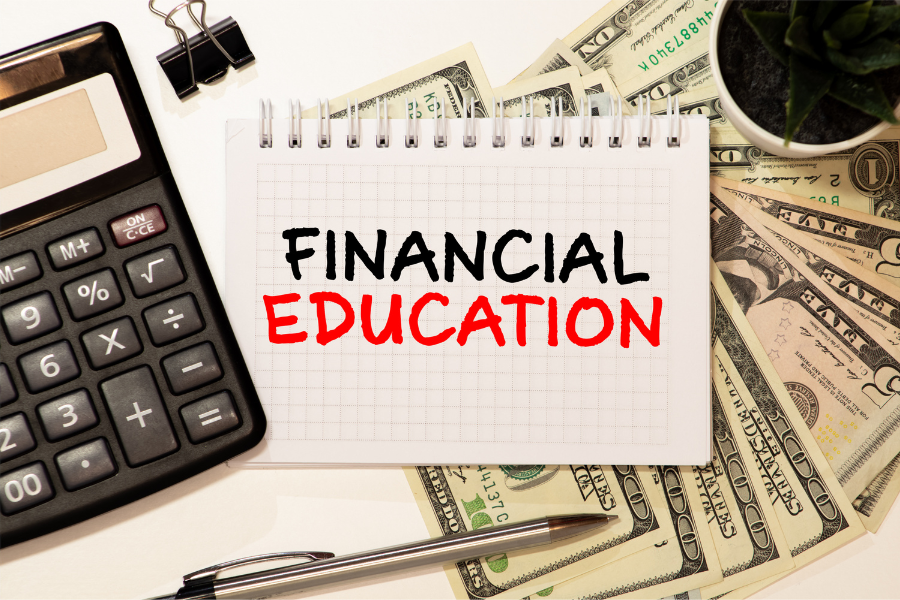This article may contain affiliate links. See our disclaimer for more information.

As someone who has been on a journey to master financial education myself, I know firsthand the challenges that can come with it. It takes discipline, and a willingness to learn and grow. However, I believe that the rewards of gaining financial literacy and understanding money management are immeasurable. In this article, I will share with you valuable tips and strategies to help you on your own journey to mastering financial education.
Whether you are just starting out or have been on this journey for a while, there is always more to learn. By applying the principles of financial education, I have been able to take control of my financial future and continue to build solid financial habits. Let’s explore the fundamentals of money management, investment strategies, financial planning, and more.
Together, we can gain the knowledge and skills needed to become financially independent and secure.
The Importance of Financial Education

I like to believe I’m a financially savvy person. After years of bouncing back and forth on my finances, I’ve come to understand that a good personal finance education is crucial for everyone’s success. Financial literacy is not just desirable but necessary in today’s increasingly complex financial world.
I would make a great financial decision, followed by some very questionable ones. I would save thousands by using the cash envelope method, only to drop the system and blow through thousands of dollars once I started working significant overtime. Once I started working on my finance education and developing my financial literacy skills, I began to accomplish goals, avoid mistakes, and set myself up for a secure future.
Acquiring personal finance education has several benefits. Here’s what it can do for you:
- Make informed financial decisions
- Manage money efficiently
- Reduce debt
- Increase savings
- Build long-term wealth.
In today’s fast-paced financial environment, financial education is not just an advantage but a necessity. It can give a competitive edge to prosper in life.
Learning financial literacy skills helps us keep up with the latest financial trends, and respond wisely to market changes. It is a huge help to develop the mindset of successful investors, learn to manage risk, diversify portfolios, and reap the rewards of long-term investing.
It is crystal clear that personal finance education must be at the top of our priority lists for a lifelong journey towards financial empowerment. By seeking knowledge, building skills, and taking action, we can transform ourselves into financially savvy individuals, achieve goals faster, and build a better future for ourselves and our loved ones. Are you ready to get started with your financial education? Read on.
Money Management Basics

Effective money management is key to maximizing resources. This means you need to understand how to budget, save, and manage debt in a responsible way. Implementing the basics of money management can help take control of our financial future and reach those financial goals.
- Budgeting Techniques: To create a budget, reflect on income and expenses to prioritize spending. By tracking spending habits, you can see where you need to make adjustments to avoid overspending.
- Saving Strategies: Set savings goals and regularly contribute a portion of your income to achieve these goals. Having an emergency fund and saving for future expenses like a down payment on a house is essential.
- Debt Management: Minimize debt by prioritizing repayment based on interest rates. Pay off high-interest debt first and make sure to maintain timely payments on all debts.
For more on how to make a budget planner check here.
Check here for savings tips.
Learn more about managing debt with this article.
By mastering these foundational components of money management, you can create a solid financial foundation and gain the confidence to take on more advanced financial challenges.
Investment Education

Investment education is key to building wealth over time. By gaining a solid understanding of different investment options and strategies, you can take control of my financial future and achieve your financial goals.
One of the first steps in investment education is determining risk tolerance. This will help decide which types of investments are best. From there, explore different investment options, such as stocks, bonds, mutual funds, and real estate.
Another critical aspect of investment education is understanding the impact of fees and expenses on investment returns. By choosing investments with lower fees and actively managing your portfolio, returns can be maximized and expenses can be minimized.
Ultimately, investment education is about understanding your investments enough to create a diversified portfolio that aligns with your financial goals and risk tolerance. By combining different investment options and strategies, you can build wealth over time and achieve financial independence.
Financial Planning for a Secure Future

Financial planning is an essential component of securing your long-term financial future. To achieve financial success, it is critical to set clear financial goals and develop strategies to reach them. By creating a budget, you can set aside funds for your short and long-term financial goals, such as purchasing a home, starting a business, or planning for retirement.
In addition to goal setting and budgeting, it’s crucial to prioritize retirement planning. Taking advantage of retirement savings options such as 401(k)s or IRAs can help ensure a comfortable retirement. It’s important to consider factors such as Social Security benefits and health care costs as part of your retirement planning strategy.
Lastly, having an emergency fund can provide a safety net in the event of unexpected expenses such as medical bills or a job loss. By having a financial cushion, you can avoid the stress of not having enough funds to cover life’s unexpected costs.
Overall, financial planning is a crucial aspect of achieving financial security and independence. By having a financial education that includes these important components, anyone can take control of their financial future and achieve their long-term financial goals.
Tips for Building a Strong Credit Score

If you’re looking for a way to improve your financial situation, building and maintaining a strong credit score is a must. A good credit score can help you secure better loan terms, lower interest rates, and even improve your chances of getting hired for certain jobs.
To start building your credit score, first, you must understand the significance of a good score. Your credit score is a reflection of your creditworthiness, which lenders use to determine your eligibility for credit.
To maintain a strong credit history, it’s essential to manage your credit responsibly. This involves paying your bills on time, keeping your credit utilization low, and limiting the number of new credit applications you make.
Another crucial step to building a strong credit score is monitoring your credit report regularly. Check your credit report annually for inaccuracies, and report any errors to the credit bureau.
By taking these steps, you can build and maintain a strong credit score that will serve you well throughout your financial journey. Remember, a good credit score is just one part of a comprehensive financial education, but it’s an essential component of a sound financial future.
Understanding Debt and Managing it Wisely

Debt can be overwhelming, but with proper management, it can be conquered. As I continue my financial education journey, I have come to understand different types of debt and strategies for managing them effectively.
First, it’s important to prioritize paying off high-interest debt, such as credit card debt, as soon as possible. By making more than the minimum monthly payment and negotiating lower interest rates you can save hundreds, if not thousands of dollars.
There are also debt repayment options such as debt consolidation and debt settlement, which allow you to simplify payments and reduce overall debt.
Finally, it is important to learned tactics for avoiding excessive debt, such as creating a budget and sticking to it, resisting the urge to make impulse purchases, and avoiding unnecessary loans.
By incorporating these debt management strategies into my financial planning, I have gained peace of mind and financial stability, and I hope you can do the same for yourself.
Remember, financial education is key to managing your money effectively and achieving financial freedom. By taking control of your debt, you are taking one step closer to mastering money management and securing your financial future.
Essential Insurance Knowledge

When it comes to your financial education, insurance is a crucial component that you simply can’t afford to ignore. Without proper protection, unexpected events such as accidents, illnesses, and natural disasters can easily throw your life into chaos and derail your financial plans.
Choosing the right insurance policy can be a daunting task. With so many available options on the market, it’s easy to get overwhelmed and end up with inadequate coverage or overpaying for unnecessary add-ons.
That’s why gaining insights into various types of insurance and understanding their importance in protecting your financial well-being is a vital aspect of financial education. By learning how to evaluate insurance policies and make informed decisions, you can ensure that you’re getting the right level of protection for your needs at the best possible price.
Here’s a list of things insurance can cover:
- Health – protect you and your family from costly medical bills
- Home – safeguard your property and possessions
- Auto – cover potential damages and liability
- Disability
- Renter
- Umbrella
- Travel
- Professional liability
- Casualty
- Liability
- Boiler
- Commercial
- Flood
- Cyber
- Personal injury
This is just a short list. There are so many more things insurance can cover, so it’s important to do your research so you are properly covered.
Having essential insurance knowledge is key to your financial security. Don’t wait until it’s too late to consider your insurance options. Take charge of your financial future by mastering the principles of financial education, including the crucial aspect of insurance management.
Remember, when it comes to your finances, knowledge is power. Start building your insurance education today to protect yourself and your loved ones from unforeseen financial challenges.
Saving for Retirement

When you think about the future, retirement planning should be at the forefront of your mind. Saving for retirement is key to ensuring financial stability and independence later in life. That’s why as part of your financial education, it is a priority to learn about different retirement savings options and investment strategies.
By committing to a retirement plan early on, you can take advantage of compound interest and potentially see significant growth in savings over time. One option to explore is a 401(k) plan, offered by many employers. By contributing a portion of your salary to a qualified plan, you can lower my taxable income and save for retirement at the same time.
More Retirement Options:
Another option is individual retirement accounts (IRAs). With traditional IRAs, contributions may be tax-deductible and earnings grow tax-deferred until withdrawn. Roth IRAs, on the other hand, allow you to contribute after-tax dollars and withdraw earnings tax-free.
Investment strategies are also an important aspect of retirement planning. By diversifying your portfolio and allocating my assets based on risk tolerance and investment goals, it is potentially possible to see higher returns and mitigate losses in a volatile market.
Additionally, understanding how to maximize Social Security benefits is crucial. By delaying withdrawals until full retirement age or beyond, you could receive a higher monthly benefit. Knowing the rules and regulations of Social Security can help make informed decisions about retirement planning.
I personally have several retirement accounts, as I fear not having enough money in retirement. I have a 401(k) through one employer, a 457(b) through another employer, a retirement brokerage account, and am currently in a pension plan.
With careful planning and commitment, I know that I can achieve my retirement goals and live the life I want in my later years. With the right financial education, you too can secure your financial future and retire with peace of mind.
Investing Strategies for Beginners

If you are new to investing, it’s understandable to feel overwhelmed. Having a solid financial education can help you overcome this fear and adopt a confident approach to investing. Start by learning the basics of investment strategies such as understanding risk tolerance, determining asset allocation, and recognizing the importance of diversification. These key concepts will form the foundation of your investing knowledge and help you make informed decisions about where to put your money.
Check out our guide to Master the Basics: Stock Market for Beginners
Investment education is an essential part of financial education, and it’s never too late to start learning. As you begin your journey, don’t be intimidated by complex finance jargon. Instead, focus on building a strong foundation of investing knowledge by starting with the basics. This will help you gain confidence and lead you towards more advanced investment strategies. Remember, the key to success in investing is patience, discipline, and a willingness to learn.
With a basic understanding of investing strategies, you can begin investing your money and taking control of your financial future. Start small, take calculated risks, and learn from your mistakes. By keeping these tips in mind, you can set yourself up for a bright financial future and achieve your financial goals.
Investing may seem daunting at first, but with the right investment education and mindset, you can build your wealth and achieve financial independence.
Estate Planning Essentials

Having a financial education in estate planning can be just as crucial as any other aspect of financial planning. By creating a plan, you ensure that your assets will be protected and given to the right beneficiaries. It is essential to thoroughly comprehend the fundamentals of estate planning to make the right decisions on behalf of yourself and your loved ones.
When it comes to estate planning, the important terms to remember are wills, trusts, and healthcare directives, which are the backbone of asset protection. A will is a legal document that outlines how your assets should be distributed after your death. A trust, on the other hand, is an arrangement in which your assets are managed by a trustee for the benefit of your beneficiaries. Healthcare directives specify what medical treatments you would like to have and who can make decisions on your behalf, should you become unable to make decisions for yourself.
Estate planning may seem intimidating at first, but it’s an essential part of financial planning. By taking the time to fully understand estate planning essentials, you can ensure that my wishes are carried out when the time comes.
Tax Planning Strategies

Tax planning strategies can be very important in managing your finances. By minimizing tax liabilities and optimizing it is possible to keep more of your hard-earned money and invest it towards your goals.
One effective tax planning strategy is taking advantage of deductions and credits offered by the government. This includes deductions for charitable contributions, mortgage interest, and health care expenses. Credits, such as the Earned Income Tax Credit and Child Tax Credit, can also significantly lower your tax bill.
Another strategy is investing in tax-efficient accounts such as individual retirement accounts (IRAs) and 401(k)s. These accounts offer tax-deferred growth and may allow you to deduct contributions from your taxable income.
I strongly recommend seeking the guidance of a tax professional to help you understand legal tax-saving techniques and make informed decisions that align with your financial goals.
Overall, incorporating tax planning strategies into your financial plan can have a significant impact on your financial well-being. By minimizing your tax liabilities and maximizing your finances, you can take control of your financial future and achieve financial independence.
Achieving Financial Independence

Part of the reason I’m working so hard on my financial education is to achieve financial independence as my ultimate goal. By developing effective financial planning strategies and building multiple streams of income, I can attain the freedom to live life on my own terms.
One of the most critical steps to take towards financial independence is learning how to budget and save efficiently. By controlling my spending habits and cutting down on unnecessary expenses, there is more money available to invest into different assets that yield high returns over time.
Another valuable lesson is the importance of diversifying my income streams. Instead of relying on a single source of income, diversify your investments and build a portfolio that includes different asset classes and different sources of income. This not only ensured a steady cash flow but also helped reduce the risks of potential losses.
Overall, achieving financial independence requires a strong commitment to financial education and careful planning. By honing your financial literacy skills and building long-term wealth, you can attain the freedom and security you deserve.
Navigating Economic Challenges

During times of economic uncertainty, it’s easy to panic and make rash financial decisions. But with a solid understanding of financial education and money management, you can weather the storm and make informed decisions.
Here are some steps to help navigate economic challenges:
- Avoid making impulsive decisions. It’s crucial to stay disciplined and stick to a solid financial plan even in the face of market volatility and economic downturns. By maintaining clear goals and a long-term view, you can stay on track and avoid knee-jerk reactions.
- Seek out professional advice. Financial advisors and investment professionals can offer valuable insights and guidance during uncertain times. Through their expertise, they can help you identify opportunities and make strategic decisions.
- Remain diligent and proactive in managing your finances during challenging economic times. This means regularly reviewing your investments and adjusting your portfolio as needed. It also means staying disciplined with your spending and avoiding impulse purchases.
Financial education is key to navigating economic challenges and achieving long-term financial security. By staying informed and proactive, you can protect your finances and emerge from economic downturns stronger than ever.
Conclusion

As I conclude this guide on financial education, I hope I have made it clear that acquiring knowledge in personal finance education, financial literacy, money management, investment education, financial planning, retirement planning, and budgeting is crucial for securing financial independence and achieving financial freedom.
Learning the fundamentals of money management, investment strategies, and financial planning can help maximize financial resources, build wealth over time, and create multiple streams of income. Understanding the significance of a good credit score, managing debt effectively, and evaluating insurance policies can protect your financial well-being. Don’t forget to explore retirement savings options, tax planning strategies, and estate planning to optimize your financial situation and ensure a secure future. Navigating those economic challenges and making informed decisions during uncertain times are also essential skills.
I urge you to take action today and prioritize financial education. By doing so, you can take control of your financial future and achieve the financial freedom you desire. Remember, it is never too late to start learning and mastering the principles of financial education. Start today, and your future self will thank you.





